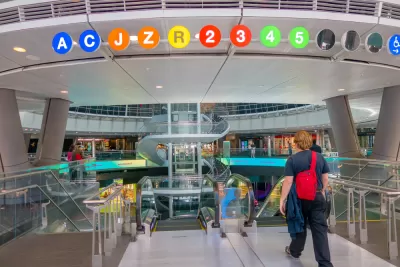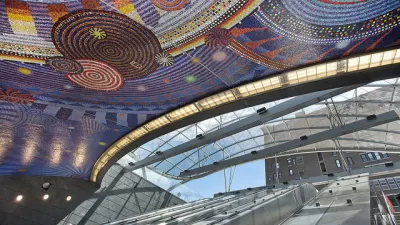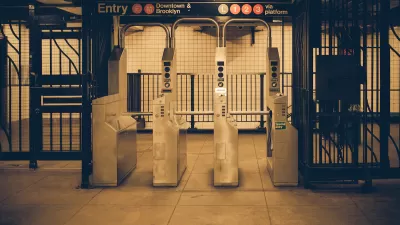The New York Times devotes feature-length coverage to the soaring costs of subway construction in New York City, where the cost of construction has reached as high as seven times the average around the world.

According to Brian M. Rosenthal, excessive staffing, little competition, generous contracts and archaic rules are responsible for dramatically inflating capital costs for transit in New York.
Two projects exemplify the scale of the problem with construction costs at the Metropolitan Transportation Authority:
The estimated cost of the Long Island Rail Road project, known as “East Side Access,” has ballooned to $12 billion, or nearly $3.5 billion for each new mile of track — seven times the average elsewhere in the world. The recently completed Second Avenue subway on Manhattan’s Upper East Side and the 2015 extension of the No. 7 line to Hudson Yards also cost far above average, at $2.5 billion and $1.5 billion per mile, respectively.
Meanwhile, the system is saddled with a maintenance backlog causing service disruptions, a frustrated public, and political conflict between the mayor and the governor.
Rosenthal takes a deep, investigatory dive into the reasons for the ballooning costs. For instance, an accountant discovered in 2010 that some 200 extra employees were employed at a $1,000 on a project to build new platforms under Grand Central Terminal. The public was never notified of the error. Rosenthal finds evidence of trade unions and construction companies ballooning costs and employment levels without scrutiny, thanks to sweetheart deals with the politicians.
"Public officials, mired in bureaucracy, have not acted to curb the costs. The M.T.A. has not adopted best practices nor worked to increase competition in contracting, and it almost never punishes vendors for spending too much or taking too long, according to inspector general reports," writes Rosenthal.
Offering my opinion on this article now: this article is one of the most revealing pieces of news reporting on planning-related subject matter in several years. It should be considered compulsory for anyone interested in improving public transit and transportation in the country's urban areas. Advocates and voters should also hold their elected officials and the MTA accountable. It's a new year—this seems like a good resolution.
FULL STORY: The Most Expensive Mile of Subway Track on Earth

Planetizen Federal Action Tracker
A weekly monitor of how Trump’s orders and actions are impacting planners and planning in America.

Congressman Proposes Bill to Rename DC Metro “Trump Train”
The Make Autorail Great Again Act would withhold federal funding to the system until the Washington Metropolitan Area Transit Authority (WMATA), rebrands as the Washington Metropolitan Authority for Greater Access (WMAGA).

DARTSpace Platform Streamlines Dallas TOD Application Process
The Dallas transit agency hopes a shorter permitting timeline will boost transit-oriented development around rail stations.

Renters Now Outnumber Homeowners in Over 200 US Suburbs
High housing costs in city centers and the new-found flexibility offered by remote work are pushing more renters to suburban areas.

The Tiny, Adorable $7,000 Car Turning Japan Onto EVs
The single seat Mibot charges from a regular plug as quickly as an iPad, and is about half the price of an average EV.

Supreme Court Ruling in Pipeline Case Guts Federal Environmental Law
The decision limits the scope of a federal law that mandates extensive environmental impact reviews of energy, infrastructure, and transportation projects.
Urban Design for Planners 1: Software Tools
This six-course series explores essential urban design concepts using open source software and equips planners with the tools they need to participate fully in the urban design process.
Planning for Universal Design
Learn the tools for implementing Universal Design in planning regulations.
Municipality of Princeton
Roanoke Valley-Alleghany Regional Commission
City of Mt Shasta
City of Camden Redevelopment Agency
City of Astoria
Transportation Research & Education Center (TREC) at Portland State University
US High Speed Rail Association
City of Camden Redevelopment Agency
Municipality of Princeton (NJ)





























